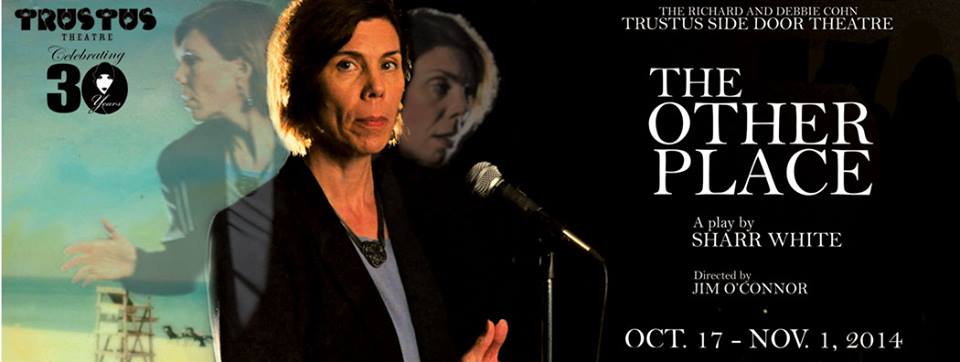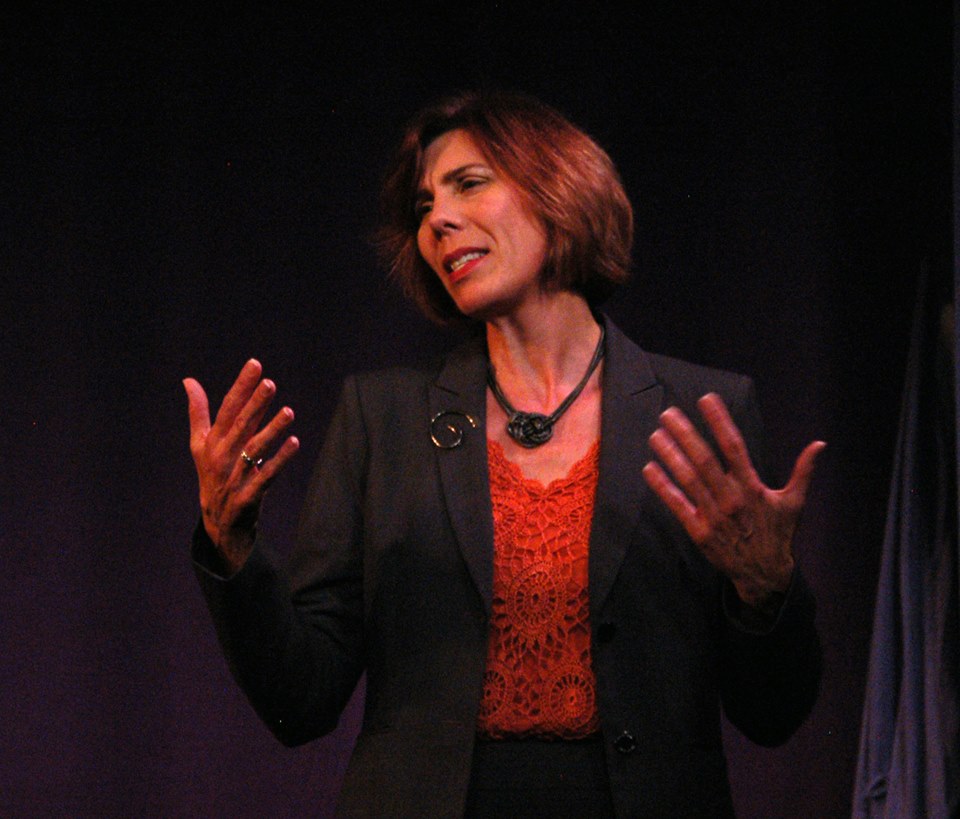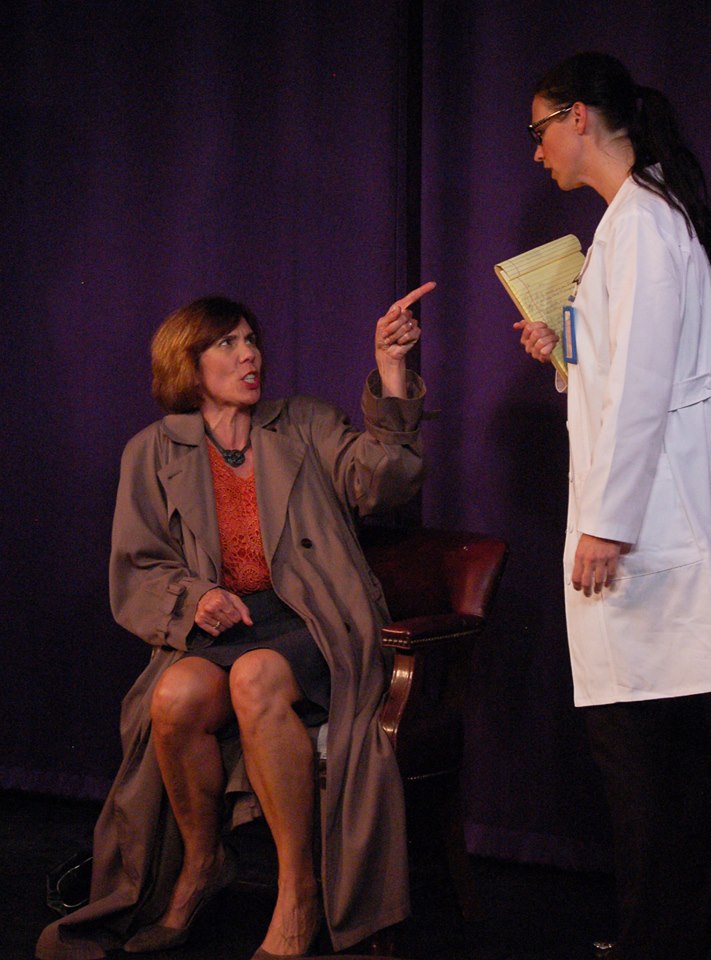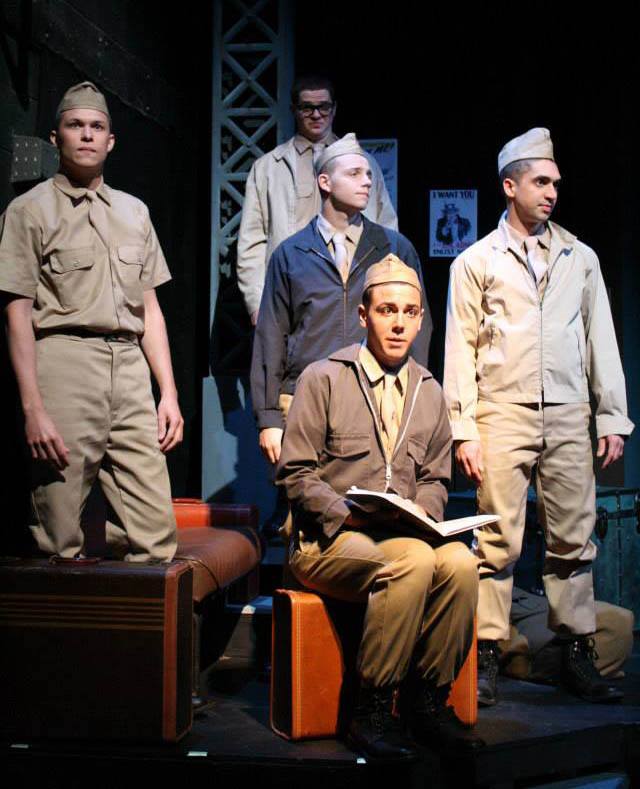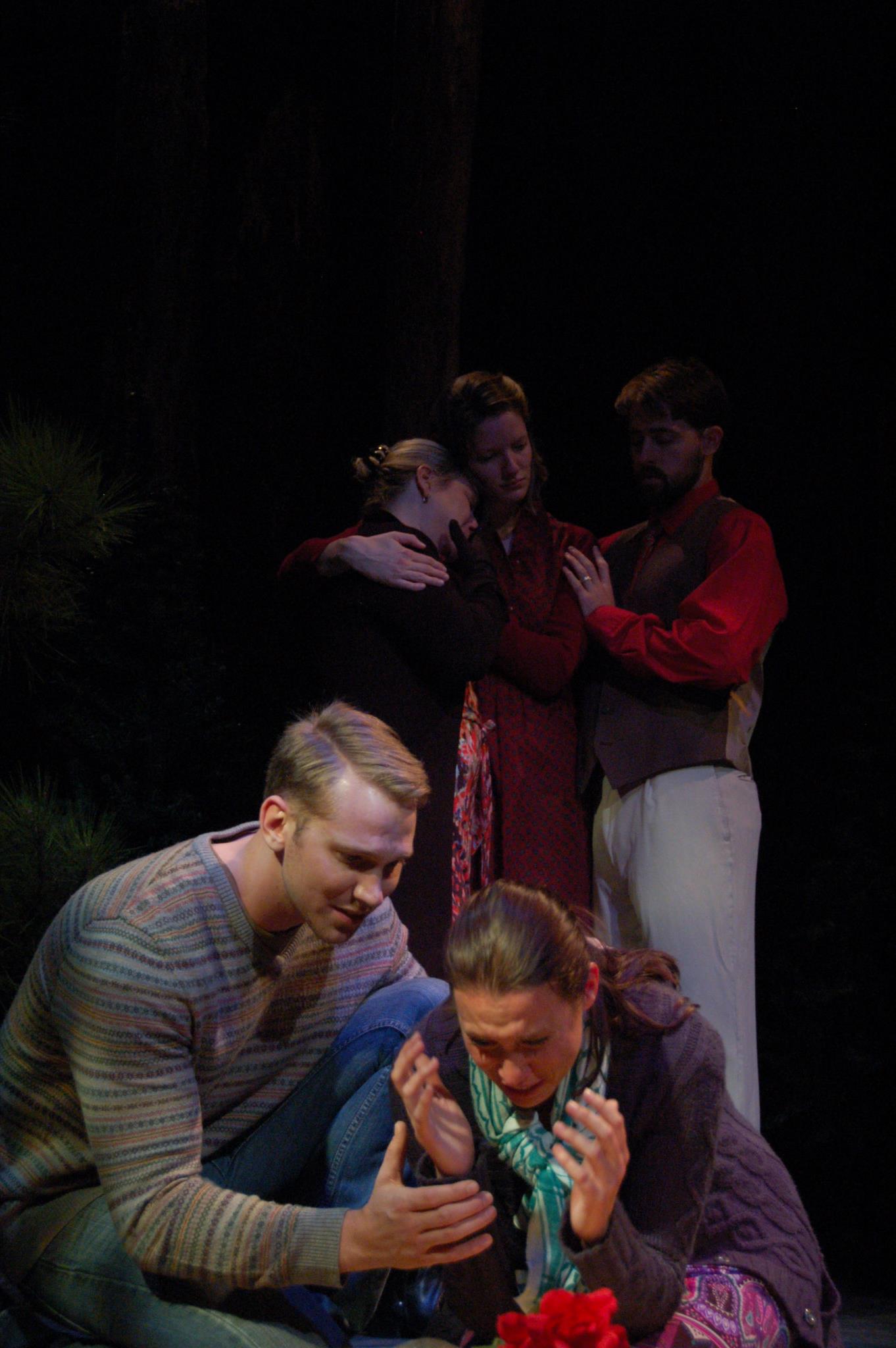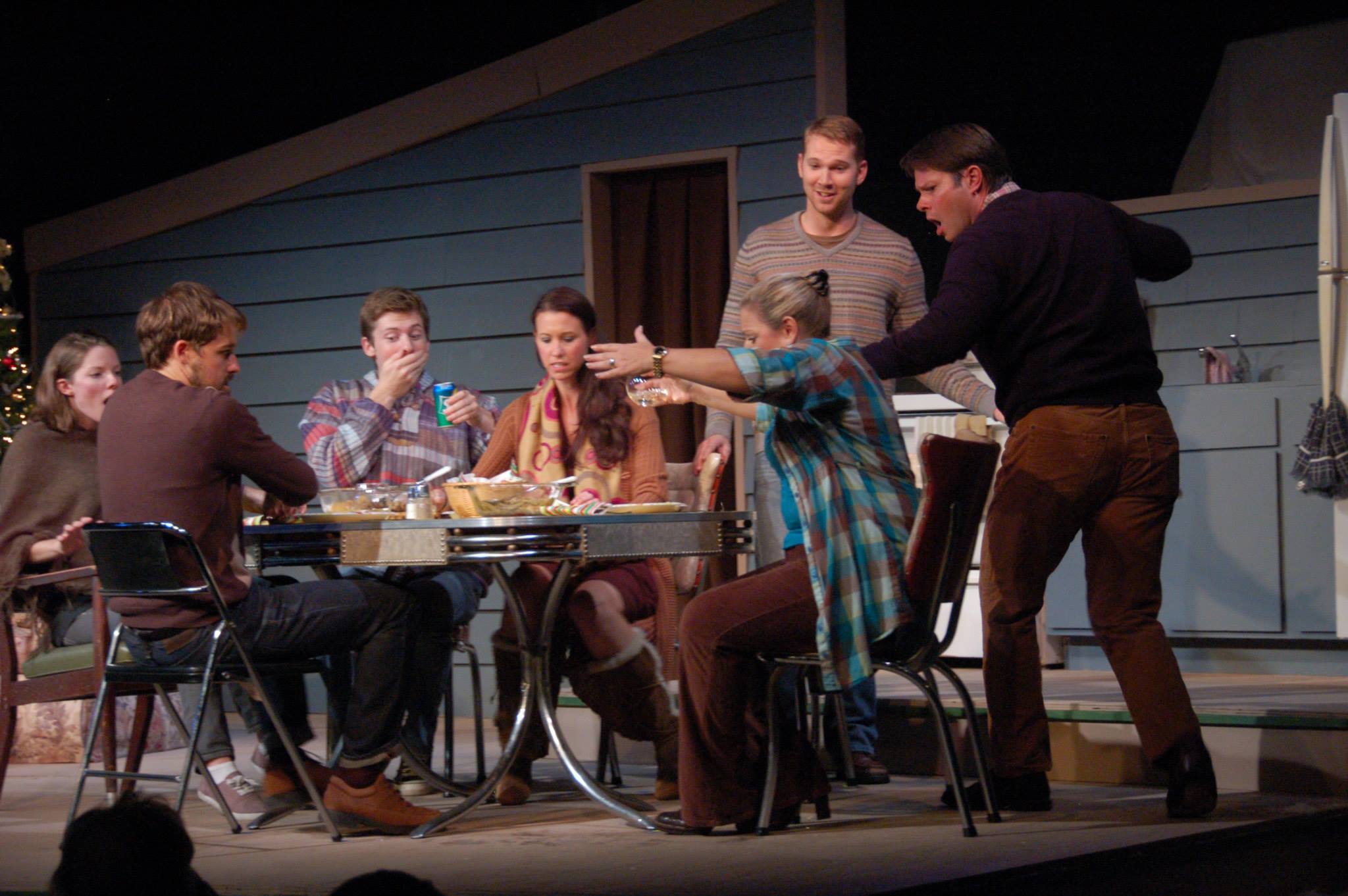”If you choose to open the door, turn to page 83.
If you choose to go down the stairs, turn to page 61.
If you choose to go up the stairs, turn to page 40.”
Those of us of the age of “that or thereabout” will certainly remember the captivating grade-school series of Choose Your Own Adventure books. For those who don’t, these gems were as close as possible to “print-interactive.” Instead of being read in linear fashion, they asked the reader to make a decision from two or three options, (following a starter page, in which a specific situation was established), and then gave directions to a page elsewhere in the book, based upon that decision.
It likely isn’t often that a production of The Crucible evokes memories of childhood reading-list favorites, but the many layers and perspectives of director Robert Richmond’s production, currently running at USC’s Longstreet Theatre, kept bringing me back to the concept of choosing my own adventure. In brief, there’s a hell of a lot going on, a reasonable amount of character ambiguity, and a wonderful opportunity for the theatre-goer to take an active role in the processing and interpretation of the director’s and actors’ art. With this in mind, and with hopes that you’ll read all three, regardless of your choice, here are your three options:
. If you think The Crucible is an indictment of the corrosive potential of religious group-think, go to paragraph 1.
. If you think The Crucible is a statement on current events, go to paragraph 2.
. If you think The Crucible is a clear-eyed observation of humanity’s inherent nature, go to paragraph 3.
1. Written as Arthur Miller’s great middle finger to McCarthyism, The Crucible may have used religious mania as a metaphor for the “Red Scare”, but its themes and imagery are now practically literal, and unsettlingly close to the times we currently face. If 81% of Evangelicals support causes and individuals who undermine the bedrock of their self-proclaimed Christianity, a once-mainstream religion has lost its way through suspicion and hate. In his role as Reverend Hale, Kaleb Edward Edley does a commendable job representing the voice of religious tolerance and reason, only to be ignored by most as too dismissive of the influence of evil and the supernatural. While Judge Danforth (well-played by Richard Edward III), has the occasional moment of civility, and even (albeit ersatz) kindness, his, like those around him, is a cherry-picked religion, laser-focused on sin and punishment. The New Testament seems tangential, at best, in the reality inhabited by these characters, with grace and forgiveness mentioned infrequently, and usually wrapped within several layers of condemnation. One need only watch a few minutes of conservative religious television or read the philosophies of most mainstream Evangelical groups to see that a subculture of judgementalism and harsh theology comparable to that of the 1620s thrives in today’s interpretation of scripture. Though not every conservative religious congregation espouses hate, suspicion, and intolerance, that element is becoming more mainstream. (I won’t go off on a tangent, but will simply say that there are plenty of examples of “traditional” churches teaching hate from the pulpit, and they’re merely a YouTube search away.) The “witches” of Salem may now appear as the homeless, the poor, the LGBTQ community, or any other oppressed group under the thumb of archaic and backward religious beliefs. While we see several members of the community start out as decent, protective, neighbours, they soon descend to back-biting and accusations against one another, each claiming moral purity. As the play proceeds, especially in the second act, the social fabric of Salem dissolves as the audience watches, and a faux-Christian mob mentality takes over. Particularly effective in demonstrating this dissolution is Hunter Boyle, as Francis Nurse. When we first meet Nurse, he is a gruff, but reasonable man, the husband of Erica Tobolsky’s Rebecca Nurse, who may be the only woman in Salem who places the value of medicine and science over homespun theology. (Tobolsky, incidentally, does a masterful job of playing a woman literally centuries ahead of her time. Her commitment to the reality of the 1620s, while still presenting a modern face of religious tolerance, brings to mind a sort of John Pavlovitz-esque figure, railing against a growing communal intolerance, while attempting to actually follow the teachings of Christ. Kudos to Tobolsky for an exceptionally nuanced performance.) As the final scenes progress, we see Boyle devolve from a rustic-but-endearing rural husband to an anger-filled man determined to save his wife from what has become a theological kangaroo court. Far from just the Taliban and Westboro Baptist, similar examples of religious mob mentality and its destructive potential can be found throughout history, and Boyle’s angry-yet-resigned second act aura provides a chilling insight into what could, can, and has happened before. Eventually, through manipulation and a “creative” interpretation of Christianity, one is left with the idea that the extremists have managed to normalize a dystopian religion and culture.
2. It would be impossible to view the events of The Crucible without at least a perfunctory nod to the similarities between the political structure of Salem and that of 2018 America. An absolutist offshoot of Christianity has managed to gain control of the religion, Church and State are dangerously intertwined with each other, and women’s rights are under their greatest attack since the 1970s. An authoritarian regime of government has aligned itself with churchgoers of the darkest and most suspicious nature. Those of (or without) faith are shouted down, often with nonsensical rhetoric, and a vague militarization of faith has become vogue in conservative circles. In a simple, yet highly effective bit of outfitting, costumer Molly Morgan has dressed David Neil Edwards (who turns in a disturbingly accurate alt-right Ezekiel Cheever) in the quasi-military getup so favored by Tea Party types and Doomsday cult militia members. Most of all, the nature of truth and reality are constantly questioned, both by the script and the production. In a world in which “alternative facts” has become a household expression, one finds a particular apprehension at watching various women branded as witches and men as liars or scoundrels, when the truth (usually) is quite different. Reality as defined by those in power is not reality, be it in the 17th or 21st century. One may call dancing in the rain a Satanic ritual, but that doesn’t make it so, no matter how vehemently the authorities may insist.
3. In its most basic and fundamental structure, The Crucible is about hypocrisy, humankind’s fallibility, self-importance, and the dehumanizing capacities of fear and mistrust. It speaks loudly and with a pointed, accusing finger at fanaticism, selfishness, negative joinerism, and a corrupt clergy-cum-government. In telling his story, playwright Arthur Miller also displays examples of the best and worst of humankind. I was particularly impressed with the emotional and psychological development of the main love triangle. As John Proctor, Darrell Johnston establishes a decent, if flawed, man who has transgressed against his marriage vows with Abigail Williams (Kimberly Braun), and lives under the eyes of his suspicious wife, Elizabeth Proctor (Libby Hawkins.) Johnston gives perhaps the most powerful performance in a show full of them, especially in his final courtroom meltdown. Having been figuratively tortured by his guilt, and literally worked over by the authorities, he delivers a passionate, enraged, terrified, and yet completely logical argument for his refusal to sign a confession that would make him free, choosing the gallows over sullying his name. Braun matches him step-for-step with a quiet pathos, feeling guilt and rejection simultaneously. As the wronged wife, Hawkins shows an admirable restraint in avoiding shrewishness or even very much of a scolding tone with her husband. She is wounded, but quietly and calmly wounded. Each of these performers work beautifully in tandem, without a single moment of wasted time or movement. We see, through the evening, a cameo or several by each of the Seven Deadly sins; lust, greed, envy, sloth, anger, gluttony, and pride. One character or another displays at least two or three of each, or faces consequences for having so done. Human nature is, apparently, timeless as well as universal.
I could go on and on about dozens of other possible interpretations of this production, but it would be a monumental task that could easily fill a book. In summation, I will say that director Robert Richmond displays his signature attention to small details and stunning visuals to bring freshness and originality to this oft-told tale. This production of The Crucible is successful in many ways, most of all in its “newness.” The audience member truly believes that these people are experiencing these events for the very first time, which, in the reality of the script, of course they are. A frequent criticism of mine when reviewing classic/older works is that they’re so well-known, the actors seem to more or less acknowledge that the audience knows the story, and turn in good, but stale performances. Such is not at all the case here. Filled with talented students, as well as a few members of the cream of the local theatre community (Jennifer Moody Sanchez, Katrina Blanding, Terrance Henderson, and the aforementioned Boyle), this cast is 100% committed to verisimilitude and consistency in character.
Full disclosure: I am not a huge fan of Arthur Miller’s work, but I was absolutely mesmerized by this production. From the opening notes of Tituba (Katrina Blanding)’s haunting chant just after curtain, to the shouts of “so-and-so was seen with the devil” in one of the more dramatic moments of the show, to the chills-up-the-spine final moment, the production held my attention, and motivated me to re-read the script sometime soon. Take it from me, even if Arthur Miller isn’t your cuppa, USC’s The Crucible will keep you glued to the story.



